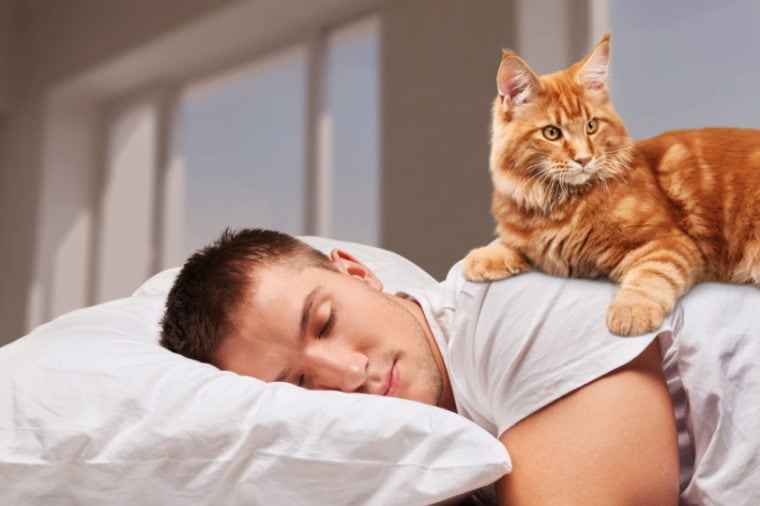
Our beloved cats can be found lounging or napping in numerous places throughout the home at just about any time of day. But when you are napping or turning in for the night, it’s not unusual for your cat to be close by.
So, could this be your cat’s way of protecting you when you’re sleeping? A lot of cats will choose to remain close to their owners as they sleep for the protection and security of everyone. Here we will talk about this behavior and some of the other reasons your cat snuggles up close while you sleep.
The 4 Reasons Cats Sleep With Their Owners
Studies have revealed that approximately 34 percent of house cats choose to sleep in their owner’s bed. There are several different reasons that cats will choose to sleep with their owner rather than in their bed or any other comfortable spot in the house. Keep in mind that each cat is an individual and will exhibit different behaviors and preferences.
1. Protection and Security
Sleeping puts your cat in a vulnerable state. In the wild, sleeping puts them at a much higher risk of attack from larger predators. It is their instinct to seek out extra protection and security while they (or you) snooze.
They aren’t necessarily standing guard over you while you sleep, but if your cat tends to sleep with you, you can rest assured you are a trusted companion and they feel safe with you. The way your cat sees it, sticking together during sleep is a means of protection and extra security for both you and them.
2. Companionship
Cats may not be pack animals with the same social structure as dogs, but that doesn’t mean domesticated house cats don’t seek companionship. They may be a more solitary species but years of domestication and living alongside humans have led them to form strong attachments to their people. Your cat may simply be sleeping with you because they enjoy your company and want to be as close to you as possible.
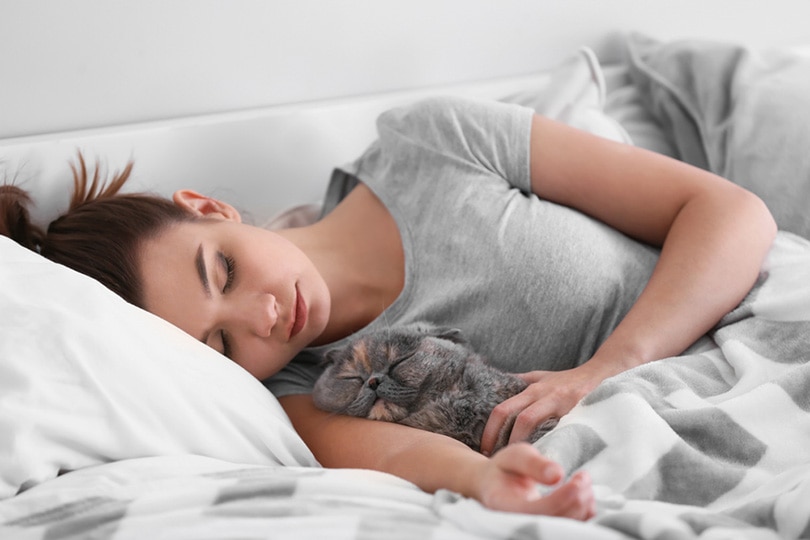
3. Comfort
Your cat may choose to sleep next to you to provide comfort. Cats are sentient beings that can pick up on emotional cues from humans and animals alike. If you are feeling anxious, stressed, or are feeling some sort of emotional distress, your cat will be able to pick up on that and may try and comfort you with their presence when you’re resting.
They may also stay close by and show you other forms of affection. An added benefit? Petting cats has been shown to reduce stress, improve mood, help relieve depression, and even lower heart rate and blood pressure in humans.
4. Warmth
Cats crave warm and comfy places to rest, so they may be choosing to sleep in bed with you for the sake of warmth and comfort. While their fur coats are built to keep them safe and warm from colder weather conditions, cats are descended from desert animals, so it’s natural for them to seek outside sources of warmth to help them conserve energy and regulate their body temperature. This allows them more energy to expend on activities revolving around their survival such as hunting or defending their territory.
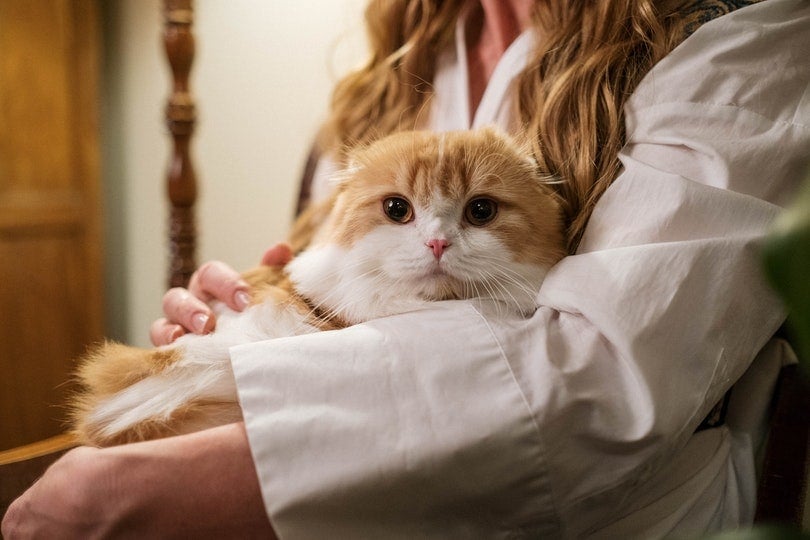
How Do Cats Choose Who to Sleep With?
If you live in a household with others, you may be wondering how your cat decided on which person in the home to share a bed with. If your cat has chosen you as their preferred person, there are a few different factors that can go into this decision.
You Provide the Food
Cats, just like other pets, can be very food-motivated. Let’s face it, even we humans are guilty of this. Cats tend to bond closely with those that provide them regular meals, after all, you’re helping them survive. So, if you are the one that provides the food, there’s a good chance you’re making your way right into their heart through their stomach.
Your Bed is the Most Comfortable
As we mentioned, cats love to be warm and cozy and they will seek out the most comfortable spot in the house that suits their taste. If your bed fits their comfortability standards, there’s a good chance you’ll have yourself a furry little bedmate. You may notice that your cat sleeps toward the foot of the bed, this gives them a better vantage point and an easier means to escape if something were to go awry.
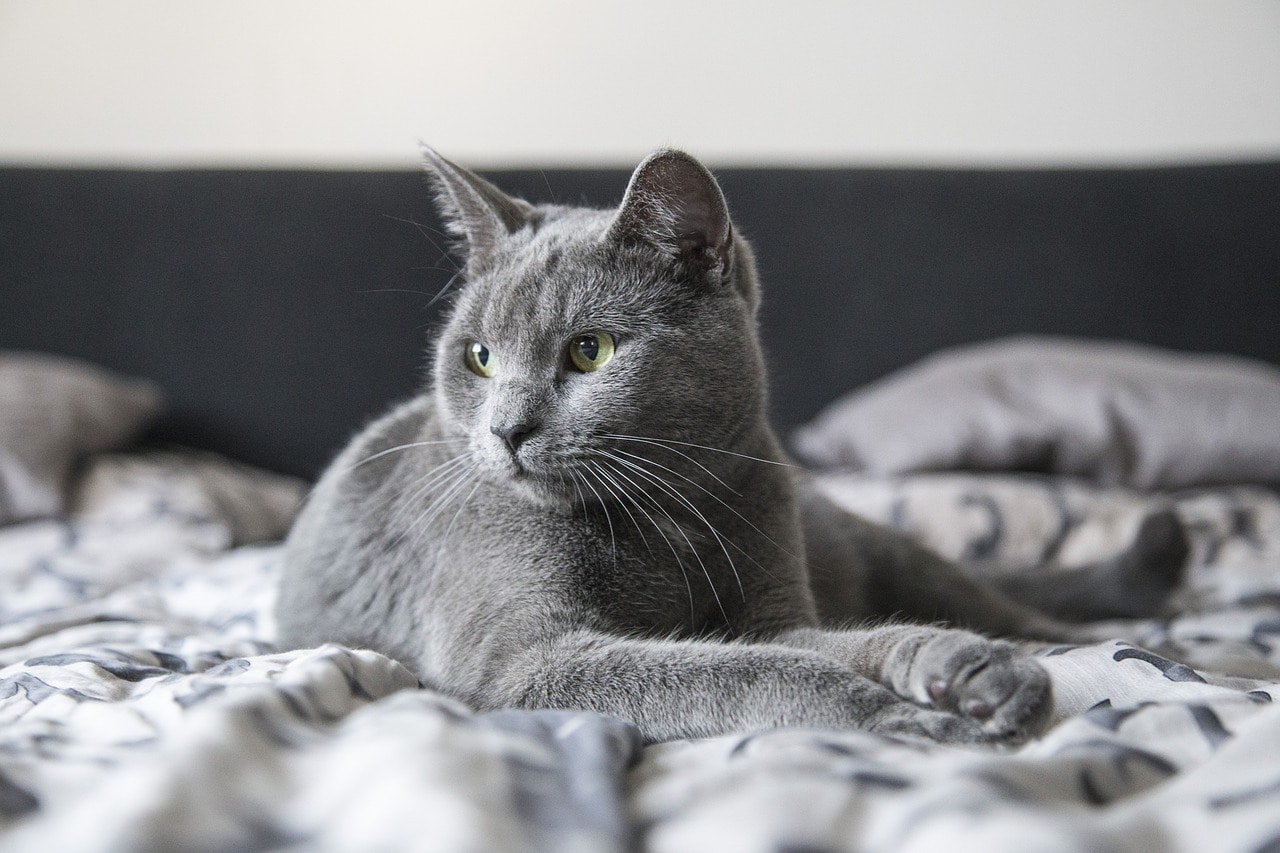
Your Cat Feels Safe with You
If you are the person in the home that makes your cat feel the safest, that plays a huge part when it comes to their sleep preferences. A cat is not going to want to be cuddled up next to someone that makes them feel insecure. This feeling of security and comfort will have a lot to do with the emotional bond they share with you. If there’s someone in the home that is more indifferent toward them, they likely won’t feel comfortable enough to share their space for sleeping.
They are Most Attached to You
Most cats tend to bond more closely with one member of the household. Of course, this isn’t the case for every cat but, generally speaking, the cat will gravitate toward the one they deem their person. They are very sensitive to sounds and smells and can even be comforted by your scent and the rhythm of your breathing and heartbeat. Cats have proven to form strong emotional attachments to their owners and if they are the type to sleep in a human bed, they’ll be most likely to choose the bed of their closest bond.

 Some Facts About a Cat’s Sleeping Habits
Some Facts About a Cat’s Sleeping Habits
Since we’re on the subject of sleep, here are some other interesting facts about cats and their unique sleeping habits.
Cats Spend Most of Their Time Asleep
This may come as no surprise to some, but cats spend more time sleeping during a 24-hour day than they do wakeful. In fact, the average cat sleeps 15 or more hours each day. Sleeping a lot during the day is a natural, built-in mechanism to ensure they have enough energy to expend on hunting. Of course, senior cats tend to sleep much more than those that are younger and can spend up to 20 hours per day asleep.

Cats are Crepuscular
There is a common misconception that cats are nocturnal animals, but that’s not true. Cats are actually what is known as crepuscular, meaning they are most active during dawn and dusk. These are the times of day when their small prey items are most active, so it only makes sense for them to be up during that prime time.
They are Light Sleepers
Cats are light sleepers by nature. They may be fierce little predators, but they are also susceptible to falling prey to larger predators or find themselves having to defend their territory in a wild setting. They must be ready to spring into action quickly, which is why small disturbances can have your cat wide awake at a moment’s notice.
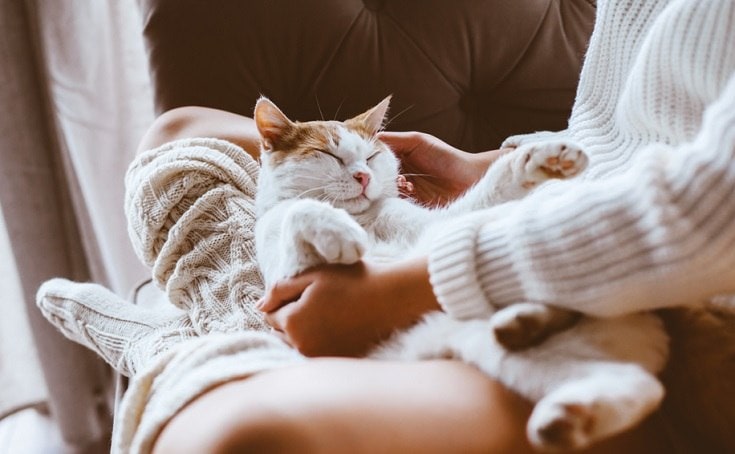
They Can Dream
Don’t hold back on wishing your cat sweet dreams before bedtime; cats have been shown to dream, too. Studies have shown that cats have even acted out hunting behaviors during REM sleep. It makes you wonder what else they could be dreaming about.
Cats May Snore
Cats are even known to snore on occasion. While snoring is not nearly as common in cats as it is in humans or dogs, it’s still considered a normal sleeping habit. Certain sleeping positions can be a factor and breeds with flatterfacial features tend to be more prone to snoring.
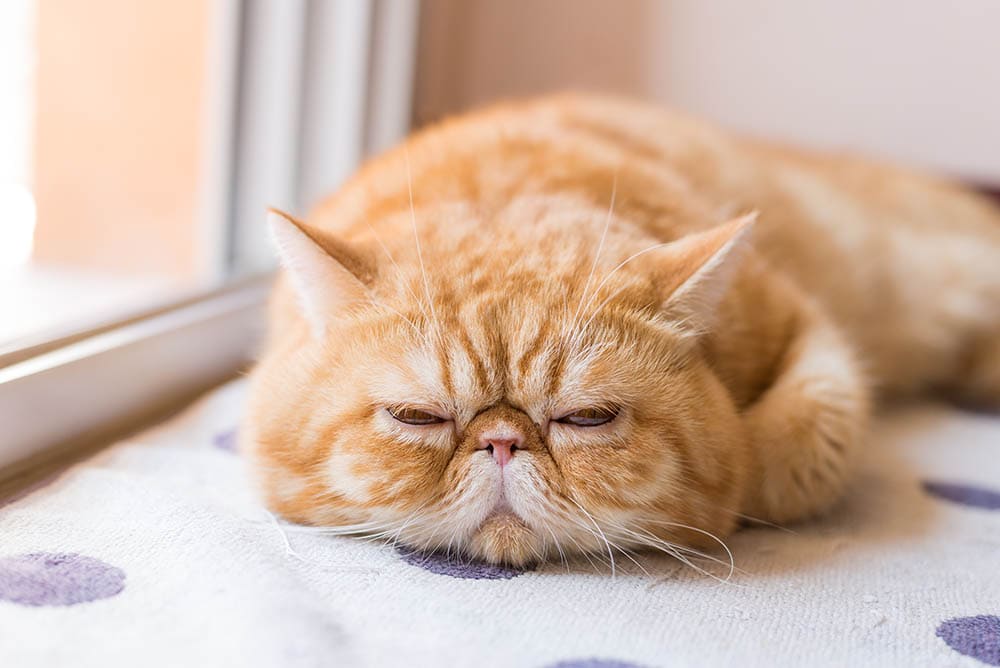
They May Rotate Preferred Sleeping Spots
Cats may not always pick and stick to the same spot to take a nap or long snooze. Cats are all about comfort, warmth, and safety and will seek out the coziest spot that provides them the most security. It’s pretty common to find your cat snuggled up in random spots throughout the house, especially during your waking hours when they aren’t worried about snuggling up to you.
Final Thoughts
Some cats tend to stick close to their owners while they sleep and it could be due to a variety of reasons. Since cats are naturally aware that sleep leaves them vulnerable, they tend to stick close to those that make them feel safe, secure, and protected. So, while your cat may not be standing guard over you ready to attack any threat that comes your way, they may be snuggled up close to you while you sleep to make sure you are both better protected from potential threats.
Featured Image Credit: Billion Photos, Shutterstock







